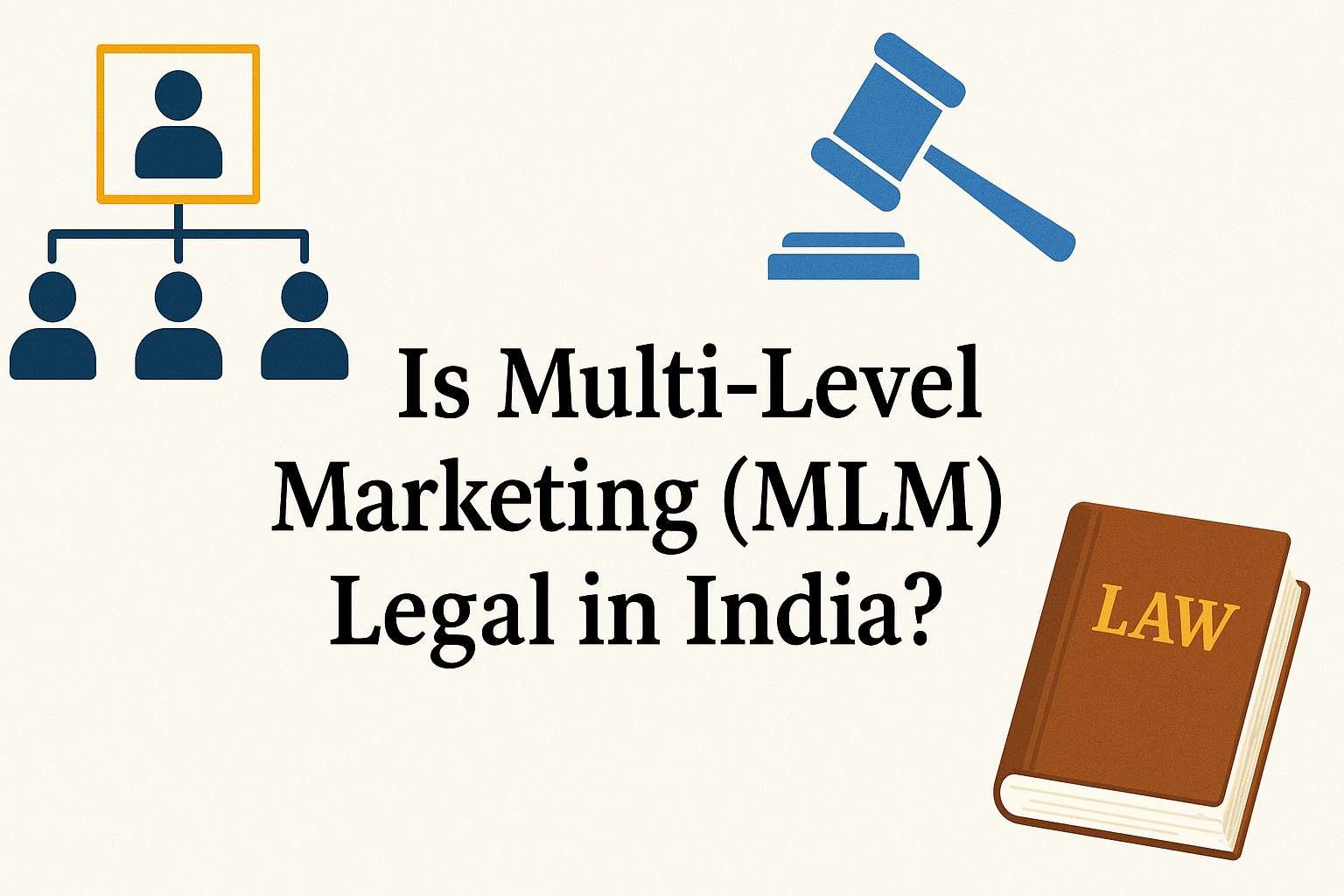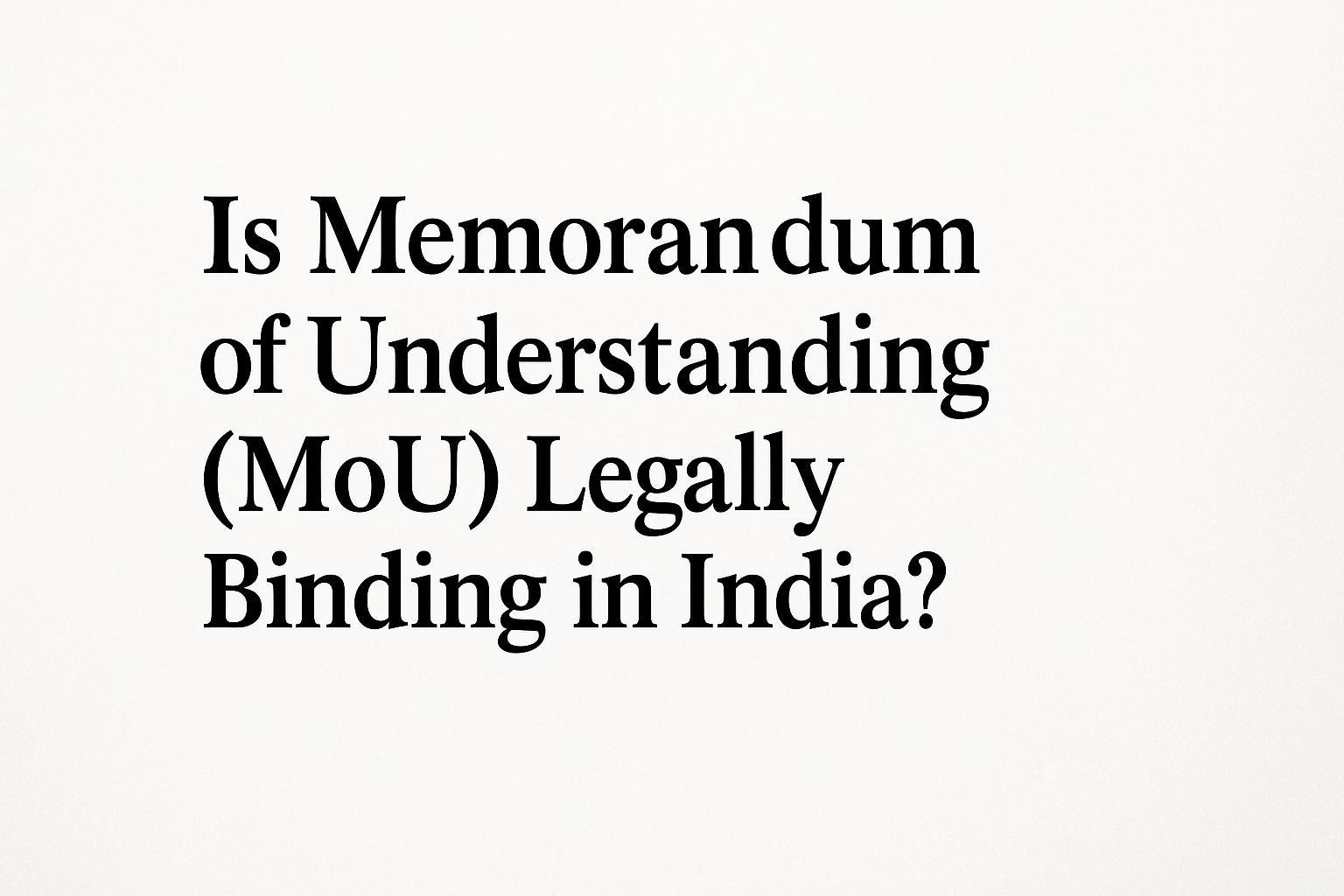On this page you will read detailed information about Is Multi-Level Marketing (MLM) Legal in India?
Yes—MLM as a method of direct selling can be legal in India, but only when it follows India’s consumer-protection framework and doesn’t operate like a pyramid or money-circulation scheme. The key legal anchors are the Consumer Protection (Direct Selling) Rules, 2021 and the Prize Chits and Money Circulation Schemes (Banning) Act, 1978. If an outfit’s earnings primarily come from recruitment fees (not bona fide product/service sales), it crosses into illegality.
The legal framework you need to know
1) Consumer Protection (Direct Selling) Rules, 2021
Notified on December 28, 2021, these Rules apply to all models of direct selling (including MLM structures) and set out duties, disclosures and accountability for direct-selling entities and their sellers. They also expressly prohibit pyramid schemes and money-circulation schemes. States are directed to create mechanisms to monitor compliance, and companies must handle consumer grievances arising from their sellers’ activities. If a direct-selling company also uses e-commerce, it must follow the Consumer Protection (e-Commerce) Rules, 2020 as well.
What this means in practice:
- No pyramid or money-circulation models—ever.
- Clear disclosures about the company, products/services, and the compensation plan.
- Grievance redressal (designated grievance officer and process).
- Ongoing compliance oversight (e.g., appointing a nodal officer; monitoring direct sellers).
Enforcement is active. For example, the Central Consumer Protection Authority (CCPA) issued notices to 17 entities in December 2024 for violations of the Direct Selling Rules—signalling that the framework isn’t just on paper.
2) Prize Chits and Money Circulation Schemes (Banning) Act, 1978
This is the anti-pyramid/anti-money-circulation law. It bans promoting or participating in schemes that pay returns mainly for enrolling new members (by whatever name called). Breaches can attract imprisonment (up to 3 years) and fines; there are search and seizure powers and provisions on company-level offences. If an “MLM” operates like a recruitment-driven chain, it risks prosecution under this Act.
Regulators emphasize this point. The RBI has repeatedly cautioned the public that acceptance of money under money-circulation/ pyramid/MLM structures is a cognizable offence under the 1978 Act and urged people to report such offers to the police.
“Direct selling” vs “MLM” vs “pyramid”: how to tell the difference
- Direct selling (including MLM structures): A lawful business model where income is linked to actual sale of genuine products or services to real customers (not just to recruits). Compensation plans reward retail sales volume, with transparent pricing, return/buy-back policies, and no mandatory purchase or joining fee that functions as a pay-to-play gate. Such entities must meet the Direct Selling Rules’ obligations.
- Pyramid/money-circulation schemes: Earnings or “returns” primarily depend on bringing in new recruits or circulating money within the chain, often with entry fees, compulsory kits, or stockpiling. There may be little or no real customer demand. These are banned by the 1978 Act—even if products are present as a façade.
A practical thumb-rule: if recruitment drives rewards and retail customers are an afterthought, it’s a red flag.
What a compliant MLM/Direct-Selling company must do in India
While the Rules are detailed, these checkpoints summarize the essentials:
- Legal presence & accountability
The entity must be a registered legal person in India (company/LLP/partnership) with a registered office, maintain local records, and appoint a nodal officer to ensure compliance with consumer-protection law and other applicable orders. - No pyramid / no money circulation
The plan cannot pay for mere recruitment or for inventory loading; income should be tied to verifiable product/service sales. - Transparent compensation plan & policies
Clear, accessible documentation of commissions/bonuses, qualification criteria, returns/buy-back, and grievance redressal must be provided to every direct seller and, in effect, to consumers. - Seller monitoring and consumer protection
The entity must monitor its direct sellers (training, conduct, claims) and remains liable for grievances arising from sellers’ sales of its goods/services. States are tasked with monitoring; CCPA has been issuing notices where needed. - If selling online
Compliance with Consumer Protection (e-Commerce) Rules, 2020—pricing transparency, returns, grievance timelines, etc.—is mandatory in addition to the Direct Selling Rules.
How authorities treat “investment-style” MLMs and quick-return promises
When so-called MLMs morph into deposit-taking/investment promises (e.g., assured returns, forex/crypto “packages” with uplines), agencies like the ED/Police often pursue them as fraud or unregulated deposit/ money-laundering cases, in addition to the 1978 Act. Recent crackdowns on “high-return schemes” marketed through networks show the risk landscape for hybrid “MLM-investments.”
Due-diligence checklist: how to evaluate an MLM opportunity in India
Use these filters before you join, buy, or promote:
- Money-in vs product-out
Are commissions/bonuses predominantly based on retail sales to real customers? If payouts flow mainly from joining fees, starter kits, or forced monthly purchases, walk away. - Written disclosures
Ask for the compensation plan and policies in writing. Check for a grievance redressal contact, return/buy-back policy, and cooling-off/returns where promised. The Direct Selling Rules expect transparency and consumer protection. - Inventory loading
If you’re nudged to buy large, non-refundable inventory just to “qualify,” that’s a classic pyramid indicator. The legal model focuses on sell-through, not stockpiling. - State & CCPA posture
Search news/CCPA updates. Notices to violators are public; persistent non-compliance is a red flag. - Investment claims
If it looks like an investment product promising fixed/assured returns via a network, check for relevant regulator permissions (SEBI/RBI) and be extremely cautious. Many such “MLM-investment” blends have ended in enforcement action.
FAQs (quick clarifications)
No—joining a compliant direct-selling/MLM entity isn’t illegal. What’s illegal is participating in or promoting a pyramid/money-circulation scheme.
Compensation must be linked to actual product/service sales. Paying primarily for enrolment/recruitment risks violating the 1978 Act and the 2021 Rules’ prohibition on pyramid/money-circulation schemes.
At the Centre: CCPA/Department of Consumer Affairs (policy and enforcement under the Consumer Protection Act, 2019). States are directed to set up monitoring mechanisms. Police and financial agencies may step in if money-circulation or fraud is involved.
Under the 1978 Act, imprisonment (up to 3 years) and fines; search and seizure powers; and company-officer liability provisions can apply.
Conclusion
MLM per se is not banned in India. It’s permitted only when it functions as compliant direct selling—with transparent products/services, retail-sale-based earnings, and robust consumer safeguards. The Consumer Protection (Direct Selling) Rules, 2021 set the compliance bar, and the 1978 anti-pyramid law draws a bright legal line against recruitment-driven money games. If the “opportunity” you’re evaluating rewards sign-ups more than sales, lacks proper disclosures and grievance handling, or resembles an assured-returns chain, it’s likely walking into illegal territory—and enforcement is getting more active. For entrepreneurs and participants, the safest path is simple: build compensation on real customer value, document everything, and comply with the Direct Selling Rules—because that’s the difference between a legitimate MLM and an unlawful pyramid.
Disclaimer
The information and services on this website are not intended to and shall not be used as legal advice. You should consult a Legal Professional for any legal or solicited advice. While we have good faith and our own independent research to every information listed on the website and do our best to ensure that the data provided is accurate. However, we do not guarantee the information provided is accurate and make no representation or warranty of any kind, express or implied, regarding the accuracy, adequacy, validity, reliability, availability, or completeness of any information on the Site. UNDER NO CIRCUMSTANCES SHALL WE HAVE ANY LIABILITY TO YOU FOR ANY LOSS OR DAMAGE OF ANY KIND INCURRED AS A RESULT OR RELIANCE ON ANY INFORMATION PROVIDED ON THE SITE. YOUR USE OF THE SITE AND YOUR RELIANCE ON ANY INFORMATION ON THE SITE IS SOLELY AT YOUR OWN RISK. Comments on this website are the sole responsibility of their writers so the accuracy, completeness, veracity, honesty, factuality and politeness of comments are not guaranteed.
So friends, today we talked about Is Multi-Level Marketing (MLM) Legal in India?, hope you liked our post.
If you liked the information about Is Multi-Level Marketing (MLM) Legal in India?, then definitely share this article with your friends.
Knowing about laws can make you feel super smart ! If you find value in the content you may consider joining our not for profit Legal Community ! You can ask unlimited questions on WhatsApp and get answers. You can DM or send your name & number to 8208309918 on WhatsApp








